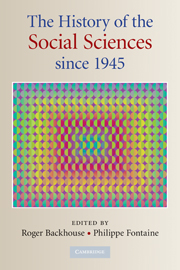5 - Sociology
Published online by Cambridge University Press: 05 June 2012
Summary
Historical Background
Work in the history of sociology has concentrated on the thoughts and biographies of great men, commonly theorists; this is in curious contrast to sociology's defining concern with social structure and typical social patterns. A common version, a sequence of theories from the mainstream of Western sociology, creates a coherent account by leaving out other societies and most empirical work and the societal differences it deals with. This chapter attempts to tell a story more concerned with empirical work and disciplinary institutions than great theorists, not entirely centred on Europe and the anglophone world, and treating as problematic the extent to which there has been one sociology with a shared history. First, the prewar background, and some of the postwar changes and demographic flows that affected later developments are outlined. Then data are presented on various aspects of sociological activity since then. In conclusion, the threads are drawn together to sketch the pattern of historical change.
To the extent that sociology was institutionalized under that name in universities before World War II, its significant presence was in France, Germany, and the United States. There was, however, a less-known presence in Japan, Latin America, and Poland, for instance, in addition to the smaller contributions of Italy and Britain, and several countries had sociological journals. But sociology did not always have a clear identity distinct from that of other social science.
- Type
- Chapter
- Information
- The History of the Social Sciences since 1945 , pp. 102 - 135Publisher: Cambridge University PressPrint publication year: 2010
References
- 9
- Cited by

